Jasper Lake Fanless Showdown: ECS LIVA Z3 and ZOTAC ZBOX CI331 nano UCFF PCs Review
by Ganesh T S on July 8, 2022 8:30 AM EST- Posted in
- Systems
- ZOTAC
- Fanless
- ECS
- Passive Cooling
- UCFF
- Mini-PC
- Jasper Lake
System Performance: Multi-Tasking
One of the key drivers of advancements in computing systems is multi-tasking. On mobile devices, this is quite lightweight - cases such as background email checks while the user is playing a mobile game are quite common. Towards optimizing user experience in those types of scenarios, mobile SoC manufacturers started integrating heterogeneous CPU cores - some with high performance for demanding workloads, while others were frugal in terms of both power consumption / die area and performance. This trend is now slowly making its way into the desktop PC space.
Multi-tasking in typical PC usage is much more demanding compared to phones and tablets. Desktop OSes allow users to launch and utilize a large number of demanding programs simultaneously. Responsiveness is dictated largely by the OS scheduler allowing different tasks to move to the background. Intel's Alder Lake processors work closely with the Windows 11 thread scheduler to optimize performance in these cases. Keeping these aspects in mind, the evaluation of multi-tasking performance is an interesting subject to tackle.
We have augmented our systems benchmarking suite to quantitatively analyze the multi-tasking performance of various platforms. The evaluation involves triggering a VLC transcoding task to transform 1716 3840x1714 frames encoded as a 24fps AVC video (Blender Project's 'Tears of Steel' 4K version) into a 1080p HEVC version in a loop. VLC internally uses the x265 encoder, and the settings are configured to allow the CPU usage to be saturated across all cores. The transcoding rate is monitored continuously. One complete transcoding pass is allowed to complete before starting the first multi-tasking workload - the PCMark 10 Extended bench suite. A comparative view of the PCMark 10 scores for various scenarios is presented in the graphs below. Also available for concurrent viewing are scores in the normal case where the benchmark was processed without any concurrent load, and a graph presenting the loss in performance.
| UL PCMark 10 Load Testing - Digital Content Creation Scores | |||

| UL PCMark 10 Load Testing - Productivity Scores | |||
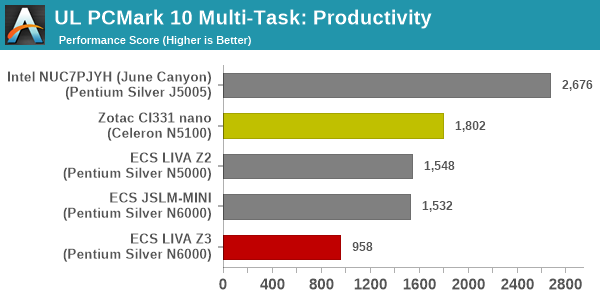
| UL PCMark 10 Load Testing - Essentials Scores | |||
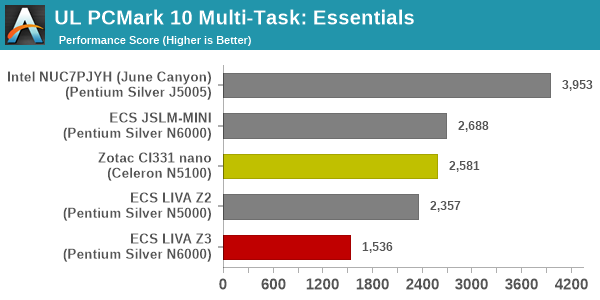
| UL PCMark 10 Load Testing - Gaming Scores | |||
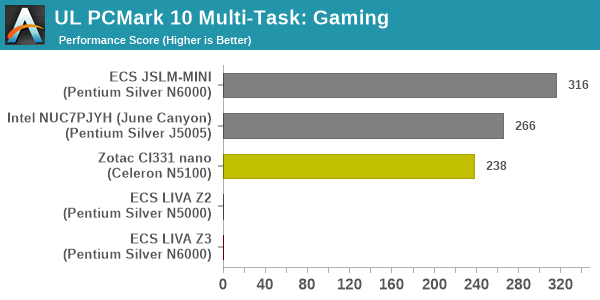
| UL PCMark 10 Load Testing - Overall Scores | |||
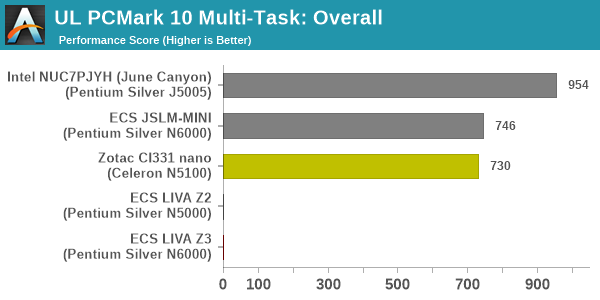
The presence of a transcoding workload in the CPU cores makes handling other tasks an uphill task for low-power PCs. The PCMark 10 workloads above bring out that aspect. The ECS LIVA Z2 and LIVA Z3 are able to only handle the 'Productivity' and 'Essentials' workload components, while ending up with a timeout on others. Other than the 'Gaming' component, we see the June Canyon NUC being most effective at handling multi-tasking due to its actively cooled nature - it has the least performance loss across almost all PCMark 10 components.
Following the completion of the PCMark 10 benchmark, a short delay is introduced prior to the processing of Principled Technologies WebXPRT4 on MS Edge. Similar to the PCMark 10 results presentation, the graph below show the scores recorded with the transcoding load active. Available for comparison are the dedicated CPU power scores and a measure of the performance loss.
| Principled Technologies WebXPRT4 Load Testing Scores (MS Edge) | |||
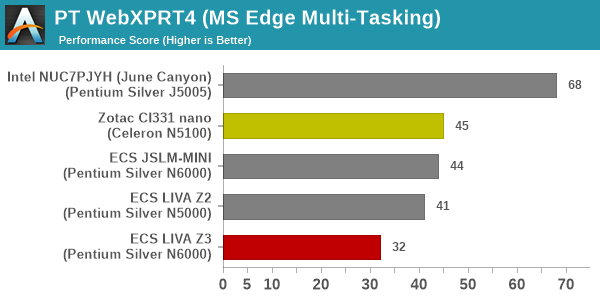
The June Canyon's WebXPRT4 scores are well behind that of the Jasper Lake-based units under normal conditions. However, addition of the transcoding workload results in significant loss in performance for the latter set. The June Canyon has limited performance loss, with its active cooling probably allowing it to go the extra mile in the presence of heavy sustained workloads.
The final workload tested as part of the multitasking evaluation routine is CINEBENCH R23.
| 3D Rendering - CINEBENCH R23 Load Testing - Single Thread Score | |||
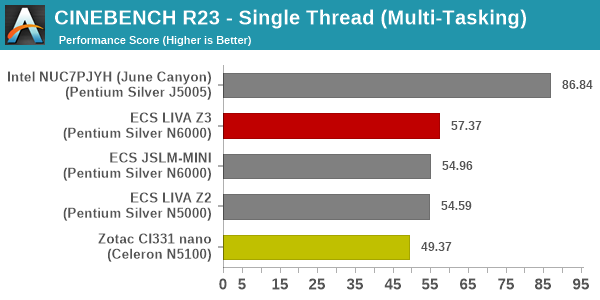
| 3D Rendering - CINEBENCH R23 Load Testing - Multiple Thread Score | |||
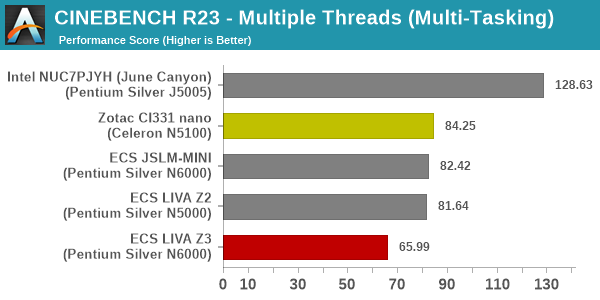
The June Canyon NUC with its active cooling comes out on top with the transcoding load active.
After the completion of all the workloads, we let the transcoding routine run to completion. The monitored transcoding rate throughout the above evaluation routine (in terms of frames per second) is tabulated below.
| VLC Transcoding Rate (Multi-Tasking Test) - Frames per Second | |||||
| Enc. Pass #1 | PCMark 10 | WebXPRT4 | Cinebench | Enc. Pass #2 | |
| ECS LIVA Z3 (Pentium Silver N6000) |
0.1541 | 0.1071 | 0.1294 | 0.1476 | 0.1424 |
| ECS JSLM-MINI (Pentium Silver N6000) |
0.2223 | 0.1635 | 0.1635 | 0.2092 | 0.2216 |
| ZOTAC ZBOX CI331 nano (Celeron N5100) |
0.3016 | 0.1943 | 0.1859 | 0.2025 | 0.1864 |
The transcoding rates drop down with simultaneous loading, as expected. For the JSLM-MINI, the first pass and second pass rates are pretty much equal, pointing to the absence of throttling. However, both the LIVA Z3 and the ZBOX CI331 nano suffer from reduced rates in the second pass - the internal temperatures are high enough for the CPU to be throttled after extended sustained loading.










52 Comments
View All Comments
mode_13h - Tuesday, July 19, 2022 - link
BTW, I'm seeing Supermicro (DDR5) W680 boards now in stock! Unfortunately, I can't say the same for DDR5-4800 Unbuffered ECC DIMMs. It's good that I'm in no hurry.Oxford Guy - Tuesday, July 12, 2022 - link
'After suspecting thermal throttling due to the lack of convective cooling for the thermal module, we decided to repeat all the benchmarking for the bare board - i.e, with the top of the chassis removed and the DMICs / WLAN functionality discarded.'What is this nonsense?
You test the product the way it is designed and sold. If it's designed by idiots it deserves the review it gets.
Oxford Guy - Tuesday, July 12, 2022 - link
ECS knows what ventilation slots are. The first model of Liva has them on the top, bottom, and sides of the unit!ganeshts - Tuesday, July 12, 2022 - link
That is pretty much what I wanted to do, but I ran the numbers just to prove to ECS that it is their chassis that is the problem, and not the internal thermal module. (Typically, we have a back-and-forth with the vendor in case things aren't performing as expected, just to make sure they can reproduce the issue on their side too).So, once I had the results, I decided to just include it in the review to show readers that the problems lie with the case.
mode_13h - Wednesday, July 13, 2022 - link
> I ran the numbers just to prove to ECS that it is their chassis that is the problemAnd thank you for doing it. Testing as-sold is fine, and those numbers should be the main ones reported. However, supplemental testing to investigate suspected design flaws is the mark of a quality reviewer.
Keep up the good work!
Oxford Guy - Saturday, July 16, 2022 - link
Zen 1 and 2, tested with JEDEC slowwww RAM and not also with any XMP profiles.LIVA Z3 tested without its case and one of its main parts.
I guess removing the protective case and the wireless Internet of a computer is more normal ordinary user behavior than turning on XMP in BIOS.
Just trying to understand the big picture here...
Oxford Guy - Saturday, July 16, 2022 - link
And, of course, that continues:‘As a result, in lieu of CPU overclocking, the biggest thing a user can do to influence higher performance with the Ryzen 7 5800X3D is to use faster DDR4 memory with lower latencies, such as a good DDR4-3600 kit. These settings are also the known sweet spot for AMD's Infinity Fabric Interconnect as set out by AMD.’
proceeds to test with 3200-speed RAM...
mode_13h - Sunday, July 17, 2022 - link
> LIVA Z3 tested without its case and one of its main parts.Yes, but only supplementing their testing in its baseline "as-sold" config. You really ought to go back and re-read stuff before rage-posting about it.
"The numbers for this configuration are referenced using ECS JSLM-MINI (the motherboard's model name) in the relevant sections."
Where data from this configuration is posted, you'll see *both* ECS LIVA Z3 *and* ECS JSLM-MINI, showing just how much the Z3 is hurt by the poor airflow of its chassis.
Oxford Guy - Sunday, July 17, 2022 - link
'You really ought to go back and re-read stuff before rage-posting about it.'Your usual ad hom routine won't change this interesting inconsistency.
mode_13h - Sunday, July 17, 2022 - link
> Your usual ad hom routineNo, you're flat-out wrong. Trying to shift the subject back on me won't change that. I'd almost feel bad for you embarrassing yourself like this, but you never seem to tire of reminding us what an unpleasant person you are.
FYI: the correct response, when you've been caught leveling a false allegation is: "Oops. Sorry." Anything else just makes it worse.